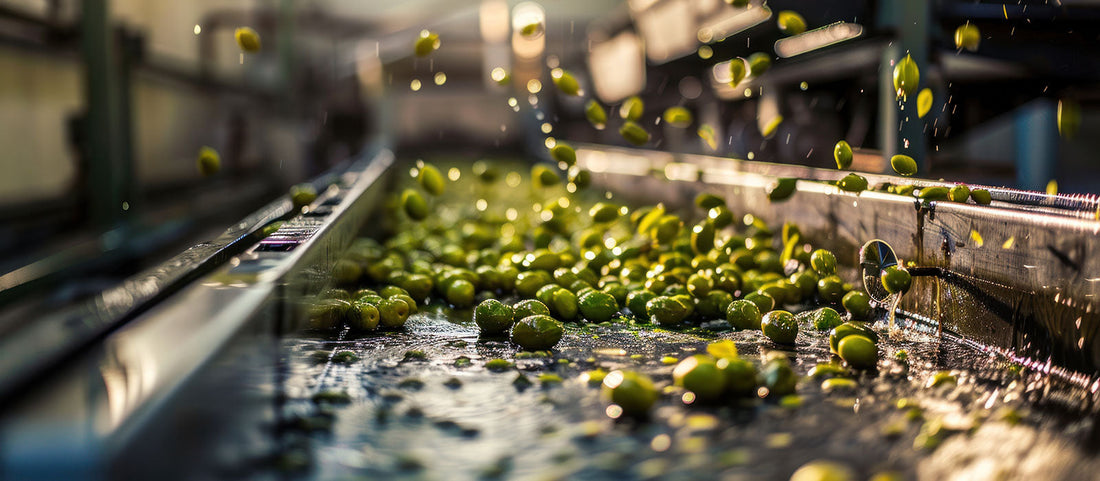
3 Truths Every Health-Conscious Buyer Should Know About Olive Oil
Olive Oil Is Everywhere—but Not All Oils Are Equal
If you’re trying to make healthier choices, olive oil probably sits high on your list.
It’s celebrated for its heart-healthy fats and anti-inflammatory benefits, and it's a staple in the Mediterranean diet. But walk down the olive oil aisle and suddenly it’s not so simple.
You’ll see terms like cold-pressed, organic, extra virgin, and first harvest thrown around—often with no explanation. So how do you know what truly matters for your health?
Let’s clear it up. These three truths will help you cut through the noise, shop smarter, and choose an olive oil that actually delivers the benefits you’re looking for.
Truth #1: Cold-Pressed Doesn’t Guarantee Quality
"Cold-pressed" sounds like the gold standard for olive oil. And while it's an important part of the process, it’s not the full story.
In reality, the term isn't tightly regulated, and many oils that claim to be cold-pressed may still be processed in ways that reduce their nutritional value. What matters more is how fresh the oil is, how it’s stored, and most critically—its polyphenol content.
Polyphenols are powerful plant compounds responsible for olive oil’s anti-inflammatory and antioxidant effects. Without a high polyphenol count, even a cold-pressed oil won’t offer the health benefits you might expect.
Look for lab-tested polyphenol levels—not just buzzwords.
SP360, for example, is cold-extracted and independently lab-tested, with 1,462 mg/kg of polyphenols—placing it among the most potent oils available. That’s what makes a real difference.
Truth #2: Looking Beyond the Buzzwords
Labels can be helpful—but they don’t always tell the whole story.
Terms like “organic” or “first press” might catch your eye, and certifications can certainly reflect certain farming standards. But when it comes to olive oil that actually supports your health, what matters most often isn’t listed front and centre. Polyphenol levels, harvest timing, milling methods, and traceability—these are the real markers of quality. And they’re rarely captured in a buzzword.
In fact, some beautifully packaged oils are blends from multiple regions, made with overripe olives, or stored for months before bottling. Even trees affected by disease can still qualify under broad certifications due to technical loopholes. The result? An oil that sounds impressive—but delivers little in the way of actual health benefits.
What truly makes a difference is the process: where and how the olives are grown, when they’re picked, and how quickly they’re milled. Oils produced on-site, using an in-house mill and fresh early-harvest fruit, tend to be higher in polyphenols, better preserved, and more flavourful. Add independent lab testing and a transparent supply chain, and you’re getting much closer to the real thing.
It’s not about dismissing labels—it’s about looking deeper. Great olive oil should be traceable, tested, and tell its story through both science and flavour. And once you know what to taste and smell in a high-quality EVOO, there’s no going back.
Truth #3: Most Olive Oils Don’t Contain Enough Polyphenols to Deliver Real Benefits
Polyphenols are the true stars of high-quality olive oil. They help lower inflammation, fight oxidative stress, and support heart and brain health. But here’s the problem: most olive oils on the market contain very little of them.
The European Food Safety Authority (EFSA) states that an olive oil must contain at least 250 mg/kg of polyphenols to provide antioxidant protection. Many supermarket oils fall well below this threshold—especially if they’ve been refined, blended, or stored improperly.
If your olive oil doesn’t say how many polyphenols it has—it probably doesn’t have many.
This is why lab-tested, high-polyphenol oils stand out. Oils like SP360 (1,462 mg/kg) deliver functional levels of polyphenols that can genuinely support your health when used daily.
How to Shop Smarter and Feel Better About Your Choice
You don’t need to be an expert to find an olive oil that supports your health. What you do need is a clear sense of what actually matters. Here are five essential things to look for:
- Verified polyphenol content: The label should state the polyphenol level, ideally backed by third-party lab testing.
- Cold extraction and proper storage: Look for oils that are cold-extracted and bottled in UV-protective glass to preserve quality.
- Harvest date transparency: Freshness matters. Choose oils that display a harvest date rather than just a best-before.
- Single origin and full traceability: Oils from a specific estate or region offer more consistency and quality control.
- Sustainable, honest sourcing: Support brands that value eco-friendly packaging, ethical farming, and transparency.
- If you're seeking real health benefits—for your heart, brain, and body—it's worth choosing a product that's crafted with purpose. Explore high-polyphenol options like SP360 and start using olive oil the way it was meant to be used: with intention, trust, and confidence.
